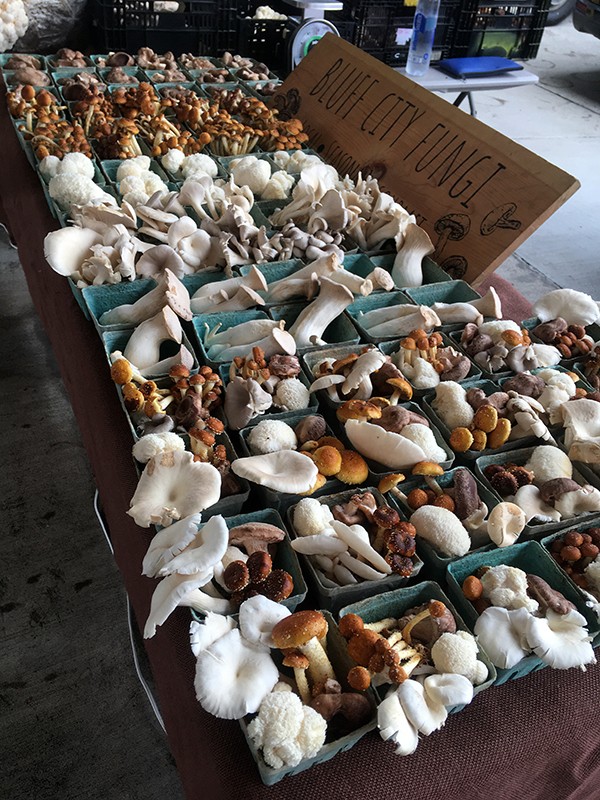COVID-19 is radically changing how local restaurants operate, and, in tow, local farmers are facing mounting challenges as well.
“To be completely frank, it’s run us ragged,” says Scott Lisenby, who operates Bluff City Fungi.
“Our day-to-day operations have changed dramatically almost overnight. We’re running on a skeleton crew, and we’re working at 110 percent to keep up with the almost daily changes,” he says.

Fungus among us: Bluff City Fungi
Local restaurants are reporting dramatic losses in sales, which has had an inevitable impact on the farmers from whom they source their food.
For example, Ed Cabigao, one of the owners of Zaka Bowl, Interim, and South of Beale, has experienced this phenomenon at each of those restaurants — which all source food from local farmers.
“Interim experienced an 80 percent drop in sales instantly,” Cabigao says. “S.O.B. experienced a 30 percent drop in sales initially, and it has now dropped to around 50 percent. Zaka Bowl experienced a 50 percent drop in sales and has held at that.
“Interim was the first concept where we closed the dining room because of sales, and also because it’s pretty clear that the pandemic should be taken very seriously,” he says. “We are right next to a retirement home and a pediatrician’s office, so that helped strengthen our decision.”
The effects of restaurant closures like these have been felt throughout the local farming community.
“Since farming takes months and months of planning ahead, we have tens of thousands of dollars worth of product coming up and no one to sell it to,” Lisenby explains.
“The majority of our business is direct to restaurants and wholesalers, and, understandably so, almost every single one of those streams of income has dried up overnight,” he adds.
“The nature of the restaurant business relies on a constant flow of sales every single day, and when a sharp, unprecedented decrease happens so swiftly, and coupled with the fact that there has been no direction or leadership in terms of when we can expect the pandemic to pass, it forces us as business owners to make very difficult decisions,” says Cabigao.
Though they’re considered essential businesses, farmers markets are having to make tough decisions, too. It was recently announced that the opening of this year’s Memphis Farmers Market (MFM), originally scheduled for April 4th, would be delayed and projected to open on May 9th instead.
“We feel it is our responsibility to do our part to flatten the curve and help stop the transmission of this virus through our city,” says Robert Marcy, executive director of MFM.
“Please know that we made this decision with the entire MFM community in mind, as the health of our vendors, customers, volunteers, and staff is most important, and whatever measures we need to take to ensure their health and safety are the proper ones,” he adds.
Sandy Watson, market director of the Cooper-Young Farmers Market, is also adapting rapidly to changing circumstances.
“This situation can’t help but have a lasting impact — the community has been forced to cook at home more now that restaurants are closed,” says Watson, recognizing that the need to access fresh food is more important than ever.
“Will that continue after this is over? Will restaurants be able to recover from this? Some will not,” Watson says.
It’s not too late to support your local farmers, and many have transitioned to online sales and home delivery.
Lisenby offers his own advice: “Please shop local. Please. Your farmers are adapting to better serve you right now, many will deliver or ship right to your door, many are still working farmers markets with ramped up safety protocols.
“Reach out to your favorite local farms and see what your options are for supporting them,” Lisenby suggests.
Find out more about your options from local farmers markets at memphisfarmersmarket.org and cycfarmersmarket.org, or order from Bluff City Fungi at bluffcityfungi.com.